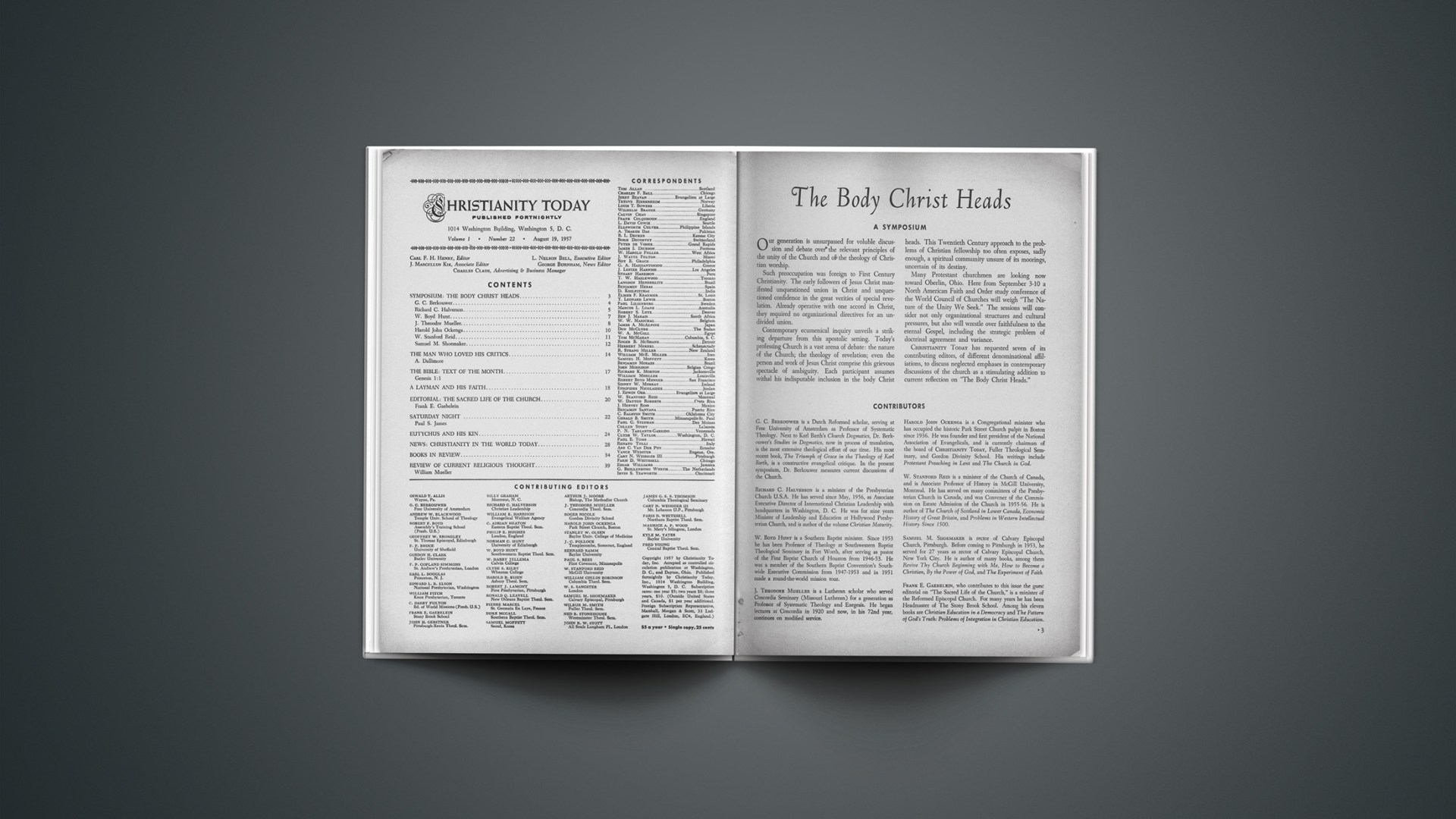A Symposium
Our generation is unsurpassed for voluble discussion and debate over the relevant principles of the unity of the Church and of the theology of Christian worship.
Such preoccupation was foreign to First Century Christianity. The early followers of Jesus Christ manifested unquestioned union in Christ and unquestioned confidence in the great verities of special revelation. Already operative with one accord in Christ, they required no organizational directives for an undivided union.
Contemporary ecumenical inquiry unveils a striking departure from this apostolic setting. Today’s professing Church is a vast arena of debate: the nature of the Church; the theology of revelation; even the person and work of Jesus Christ comprise this grievous spectacle of ambiguity. Each participant assumes withal his indisputable inclusion in the body Christ heads. This Twentieth Century approach to the problems of Christian fellowship too often exposes, sadly enough, a spiritual community unsure of its moorings, uncertain of its destiny.
Many Protestant churchmen are looking now toward Oberlin, Ohio. Here from September 3–10 a North American Faith and Order study conference of the World Council of Churches will weigh “The Nature of the Unity We Seek.” The sessions will consider not only organizational structures and cultural pressures, but also will wrestle over faithfulness to the eternal Gospel, including the strategic problem of doctrinal agreement and variance.
CHRISTIANITY TODAY has requested seven of its contributing editors, of different denominational affiliations, to discuss neglected emphases in contemporary discussions of the church as a stimulating addition to current reflection on “The Body Christ Heads.”
Contributors
G. C. BERKOUWER is a Dutch Reformed scholar, serving at Free University of Amsterdam as Professor of Systematic Theology. Next to Karl Barth’s Church Dogmatics, Dr. Berkouwer’s Studies in Dogmatics, now in process of translation, is the most extensive theological effort of our time. His most recent book, The Triumph of Grace in the Theology of Karl Barth, is a constructive evangelical critique. In the present symposium, Dr. Berkouwer measures current discussions of the Church.
RICHARD C. HALVERSON is a minister of the Presbyterian Church U.S.A. He has served since May, 1956, as Associate Executive Director of International Christian Leadership with headquarters in Washington, D. C. He was for nine years Minister of Leadership and Education at Hollywood Presbyterian Church, and is author of the volume Christian Maturity.
W. BOYD HUNT is a Southern Baptist minister. Since 1953 he has been Professor of Theology at Southwestern Baptist Theological Seminary in Fort Worth, after serving as pastor of the First Baptist Church of Houston from 1946–53. He was a member of the Southern Baptist Convention’s Southwide Executive Commission from 1947–1953 and in 1951 made a round-the-world mission tour.
J. THEODORE MUELLER is a Lutheran scholar who served Concordia Seminary (Missouri Lutheran) for a generation as Professor of Systematic Theology and Exegesis. He began lectures at Concordia in 1920 and now, in his 72nd year, continues on modified service.
HAROLD JOHN OCKENGA is a Congregational minister who has occupied the historic Park Street Church pulpit in Boston since 1936. He was founder and first president of the National Association of Evangelicals, and is currently chairman of the board of CHRISTIANITY TODAY, Fuller Theological Seminary, and Gordon Divinity School. His writings include Protestant Preaching in Lent and The Church in God.
W. STANFORD REID is a minister of the Church of Canada, and is Associate Professor of History in McGill University, Montreal. He has served on many committees of the Presbyterian Church in Canada, and was Convener of the Commission on Estate Admission of the Church in 1955–56. He is author of The Church of Scotland in Lower Canada, Economic History of Great Britain, and Problems in Western Intellectual History Since 1500.
SAMUEL M. SHOEMAKER is rector of Calvary Episcopal Church, Pittsburgh. Before coming to Pittsburgh in 1953, he served for 27 years as rector of Calvary Episcopal Church, New York City. He is author of many books, among them Revive Thy Church Beginning with Me, How to Become a Christian, By the Power of God, and The Experiment of Faith.
FRANK E. GAEBELEIN, who contributes to this issue the guest editorial on “The Sacred Life of the Church,” is a minister of the Reformed Episcopal Church. For many years he has been Headmaster of The Stony Brook School. Among his eleven books are Christian Education in a Democracy and The Pattern of God’s Truth: Problems of Integration in Christian Education.










